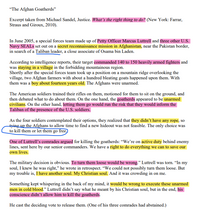
Social Psychology (10th Edition)
10th Edition
ISBN: 9780134641287
Author: Elliot Aronson, Timothy D. Wilson, Robin M. Akert, Samuel R. Sommers
Publisher: Pearson College Div
expand_more
expand_more
format_list_bulleted
Question
thumb_up100%
Question: Did commander Lutrell do the right thing? Explain your thoughts based on what you've learned on the theory of “Ethical Relativism.”

Transcribed Image Text:"The Afghan Goatherds"
Excerpt taken from Michael Sandel, Justice. What's the right thing to do? (New York: Farrar,
Straus and Giroux, 2010).
In June 2005, a special forces team made up of Petty Officer Marcus Luttrell and three other U.S.
Navy SEALS set out on a secret reconnaissance mission in Afghanistan, near the Pakistan border,
in search of a Taliban leader, a close associate of Osama bin Laden.
According to intelligence reports, their target commanded 140 to 150 heavily armed fighters and
was staying in a village in the forbidding mountainous region.
Shortly after the special forces team took up a position on a mountain ridge overlooking the
village, two Afghan farmers with about a hundred bleating goats happened upon them. With
them was a boy about fourteen years old. The Afghans were unarmed.
The American soldiers trained their rifles on them, motioned for them to sit on the ground, and
then debated what to do about them. On the one hand, the goatherds appeared to be unarmed
civilians. On the other hand, letting them go would run the risk that they would inform the
Taliban of the presence of the U.S. soldiers.
As the four soldiers contemplated their options, they realized that they didn’t have any rope, so
tying up the Afghans to allow time to find a new hideout was not feasible. The only choice was
to kill them or let them go free)
One of Luttrell's comrades argued for killing the goatherds: “We're on active duty behind enemy
lines, sent here by our senior commanders. We have a right to do everything we can to save our
own lives.
The military decision is obvious. To turn them loose would be wrong." Luttrell was torn. “In my
soul, I knew he was right," he wrote in retrospect. "We could not possibly turn them loose. But
my trouble is, I have another soul. My Christian soul. And it was crowding in on me.
Something kept whispering in the back of my mind, it would be wrong to execute these unarmed
men in cold blood." Luttrell didn't say what he meant by his Christian soul, but in the end, his
conscience didn’t allow him to kill the goatherds.
He cast the deciding vote to release them. (One of his three comrades had abstained.)
Expert Solution
This question has been solved!
Explore an expertly crafted, step-by-step solution for a thorough understanding of key concepts.
This is a popular solution
Trending nowThis is a popular solution!
Step by stepSolved in 2 steps

Knowledge Booster
Recommended textbooks for you
 Social Psychology (10th Edition)SociologyISBN:9780134641287Author:Elliot Aronson, Timothy D. Wilson, Robin M. Akert, Samuel R. SommersPublisher:Pearson College Div
Social Psychology (10th Edition)SociologyISBN:9780134641287Author:Elliot Aronson, Timothy D. Wilson, Robin M. Akert, Samuel R. SommersPublisher:Pearson College Div Introduction to Sociology (Eleventh Edition)SociologyISBN:9780393639407Author:Deborah Carr, Anthony Giddens, Mitchell Duneier, Richard P. AppelbaumPublisher:W. W. Norton & Company
Introduction to Sociology (Eleventh Edition)SociologyISBN:9780393639407Author:Deborah Carr, Anthony Giddens, Mitchell Duneier, Richard P. AppelbaumPublisher:W. W. Norton & Company The Basics of Social Research (MindTap Course Lis...SociologyISBN:9781305503076Author:Earl R. BabbiePublisher:Cengage Learning
The Basics of Social Research (MindTap Course Lis...SociologyISBN:9781305503076Author:Earl R. BabbiePublisher:Cengage Learning Criminalistics: An Introduction to Forensic Scien...SociologyISBN:9780134477596Author:Saferstein, RichardPublisher:PEARSON
Criminalistics: An Introduction to Forensic Scien...SociologyISBN:9780134477596Author:Saferstein, RichardPublisher:PEARSON Sociology: A Down-to-Earth Approach (13th Edition)SociologyISBN:9780134205571Author:James M. HenslinPublisher:PEARSON
Sociology: A Down-to-Earth Approach (13th Edition)SociologyISBN:9780134205571Author:James M. HenslinPublisher:PEARSON Society: The Basics (14th Edition)SociologyISBN:9780134206325Author:John J. MacionisPublisher:PEARSON
Society: The Basics (14th Edition)SociologyISBN:9780134206325Author:John J. MacionisPublisher:PEARSON

Social Psychology (10th Edition)
Sociology
ISBN:9780134641287
Author:Elliot Aronson, Timothy D. Wilson, Robin M. Akert, Samuel R. Sommers
Publisher:Pearson College Div

Introduction to Sociology (Eleventh Edition)
Sociology
ISBN:9780393639407
Author:Deborah Carr, Anthony Giddens, Mitchell Duneier, Richard P. Appelbaum
Publisher:W. W. Norton & Company

The Basics of Social Research (MindTap Course Lis...
Sociology
ISBN:9781305503076
Author:Earl R. Babbie
Publisher:Cengage Learning

Criminalistics: An Introduction to Forensic Scien...
Sociology
ISBN:9780134477596
Author:Saferstein, Richard
Publisher:PEARSON

Sociology: A Down-to-Earth Approach (13th Edition)
Sociology
ISBN:9780134205571
Author:James M. Henslin
Publisher:PEARSON

Society: The Basics (14th Edition)
Sociology
ISBN:9780134206325
Author:John J. Macionis
Publisher:PEARSON